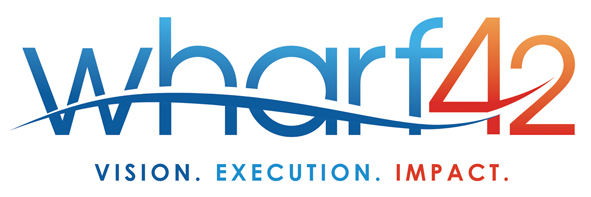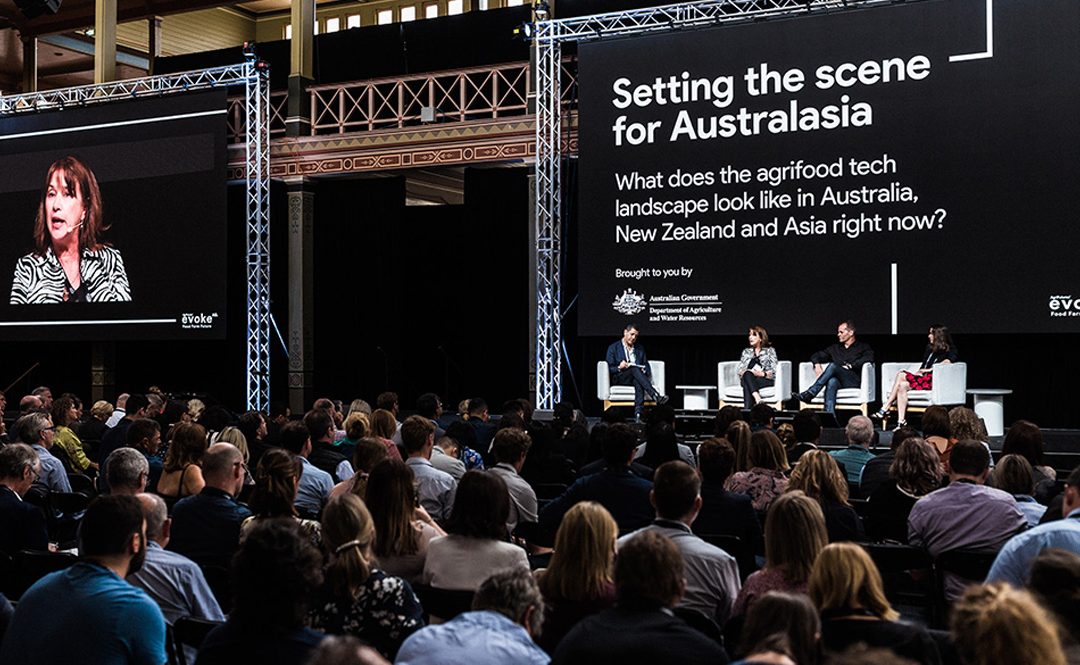
by Peter Wren-Hilton | Jun 24, 2021 | Events
AgriFutures Australia today officially announced details of their revised programme for evokeAG 2022. With the ongoing global pandemic and borders remaining closed, the decision has been made to host two one-day events; in Perth & in Sydney.
It’s great to be able to finally to share this news. I have once again been invited to be part of the evokeAG steering committee and my visit to Australia next month includes a detailed session with John Harvey and the evokeAG team at AgriFutures. Building a programme that contains a strong trans-Tasman element remains our strong joint ambition.
For the purposes of this post, I’ll simply copy and paste some of the content from today’s formal announcement. As the programme develops over the coming weeks, particularly with a New Zealand focus, expect more updates via this blog.
‘In a response to continued uncertainty with interstate and international travel, evokeAG. is going bi-coastal in 2022, taking the region’s premier agrifood innovation event to both Perth, WA and Sydney, NSW.
After two successful events in 2019 and 2020, evokeAG. will once again bring the agrifood community together – including farmers, corporates, agribusiness, researchers, startups, scale-ups, investors and government – to look at what’s next in farming technology and food innovation.
John Harvey, Managing Director of AgriFutures Australia, says that committing to host two events in 2022 is critical to supporting farmers, by driving innovation. While it has been great to connect with global stakeholders digitally over the past year, it is hard to replace in-person conversations and the energy created by bringing like-minded individuals into the same room.
“We have seen so much growth across agritech and food innovation, not just in the last 12-months but really the last three-years, with Australian and New Zealand innovators attracting increased investment and global demand each year,” said Mr Harvey.
As local and global agrifood innovation continues to mature, and grow increasingly collaborative, delivering these world-class technologies back to farmers and growers is critical.
“Working with farmers to increase profit and adopt sustainable practices is critical, connecting agrifood innovators with farmers is the key,” Mr Harvey continues, “there are a lot of great initiatives that support this, including evokeAG.”
The evokeAG. events will take place in Perth and Sydney in 2022, making it easier for people to access one of the events, regardless of border restrictions’.
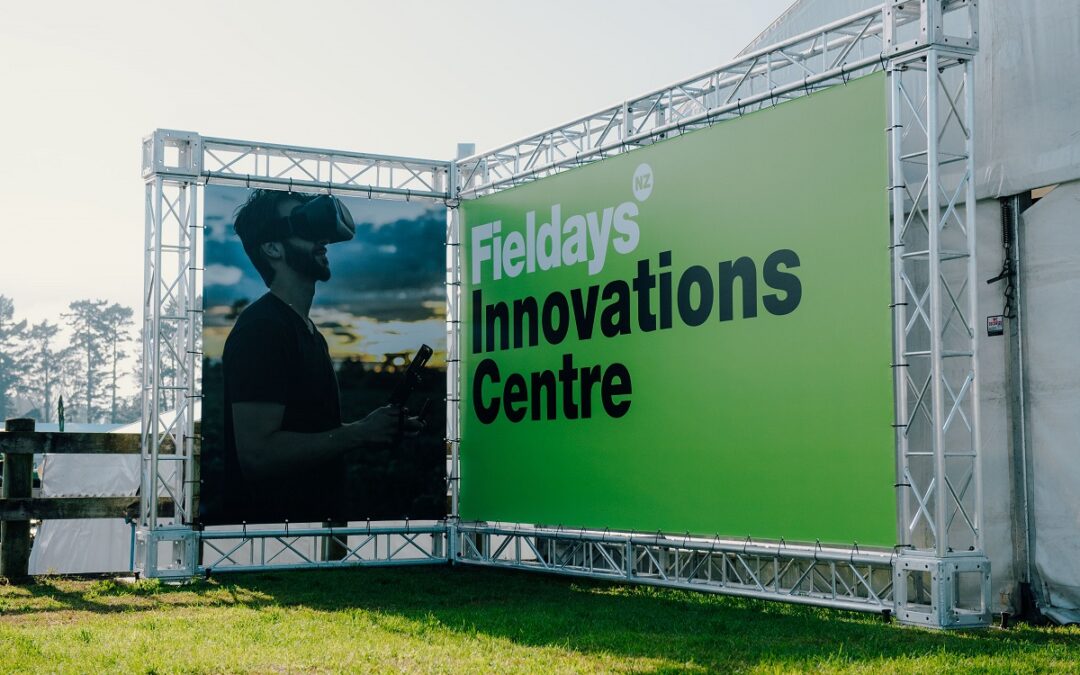
by Peter Wren-Hilton | Jun 8, 2021 | Events
With just one week to go, it’s great to be preparing to attend a 120,000 in-person event! To our followers outside New Zealand, this is the expected attendance at the 4-day National Fieldays 2021 event at Mystery Creek in 7 days time.
Fieldays is the largest agricultural event of its kind in the Southern Hemisphere. It presents New Zealand’s agricultural and primary sectors with an international marketplace to advance agriculture, while honouring its three pillars – innovation, education, globalisation.
The one thing sadly missing this year of course will be the traditional delegations of international attendees. COVID and strict border controls mean that few folk will be traveling to Mystery Creek from overseas, bar a few welcome guests from across the Tasman. It’s therefore a particular honour this year to be directly involved in one of the truly ‘global’ sessions taking place next week.
On Thursday morning, I’ll be joining Laura Clarke, the UK High Commissioner to New Zealand, and a group of international panellists, to talk about Climate, CO26 and the role of Agritech. As co-host of the AgriFoodTech Climate Summit at COP26 in November, this promises to be an interesting session. It will provide a platform to talk about the scheduled event and also provide the opportunity to announce something much closer to home.
Climate, Agritech and Cleantech are three words I expect to hear a lot of next week. With the Climate Change Commission’s final report being published by the government today, reducing greenhouse gas emissions from agricultural production and the wider agrifood supply chain will become high priorities for farmers and growers alike. Regulation can only do so much. What farmers and growers need is the technology and the tools necessary to enable them to meet new targets.
That will be the key theme of my presentation next Thursday. The need to reduce greenhouse gas emissions is completely understood. So is the investment into accelerating our research capability to make this happen.
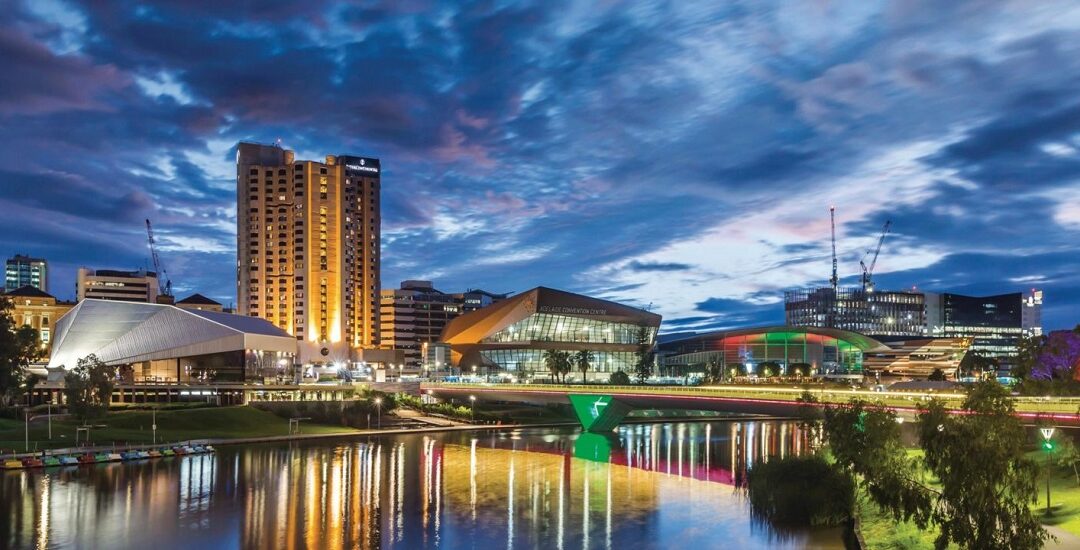
by Peter Wren-Hilton | May 3, 2021 | Events
UPDATED: 14 October 2021; Following the postponement of the the original AdvanceAg conference in July because of COVID, I’m delighted that it has been rescheduled to take place on Monday. I had planned to deliver the keynote in person, but will now be dialing in from New Zealand.
With almost 500 delegates attending the Adelaide Convention Centre in-person, it will be a great opportunity to share some of the collaborative opportunities that exist in the trans-Tasman partnership. Monday offers a fantastic opportunity to share this with an important group of South Australian agritech stakeholders.
You can learn more at AdvanceAg SA
The original post that was published on 3 May below:
I was delighted to receive an invitation from the Hon David Basham, the South Australian Minister for Primary Industries and Regional Development, to keynote at the upcoming AdvanceAg Conference in Adelaide. You can learn more about the conference here.
Back in October 2020, the Government of South Australia released the ‘South Australia AgTech Strategic Plan’. It’s a significant piece of work and a number of its recommendations resonated. I recognised that it had brought together different stakeholders including producers, government, research, industry and startups. The AdvanceAg conference is an important part of this Plan.
It’s interesting to see how the landscape in Australia (Federal v States) is taking shape. From an agritech rather than agricultural production perspective, the states seem to be accelerating activity and planning in this space. Much of the Federal focus appears to be on the performance of the Research & Development Corporations (RDCs). GrowAG (I sat on its Establishment Steering Committee) is one manifestation of that focus. As many of us know however, innovation and technology advancement is not only to be found in the publicly-funded research domain. Building a cohort of agritech businesses capable of scaling and creating impact is very often a private sector endeavour. Those businesses require the ongoing support of the wider agritech ecosystem – agribusinesses, government, investors, incubators, accelerators, as well as research. It’s building that broader ‘coalition of the willing’ that I recognised in South Australia’s AgTech Strategic Plan.
For anyone familiar with my work in New Zealand over the past 6 years, building collaborative agritech frameworks and partnerships has been a key focus. Today, that model has taken on a global lens. The Government of South Australia recognises the advances made in New Zealand and my quest is to identify opportunities for increased collaboration between the two respective sectors. AdvanceAg provides the platform to discuss this.
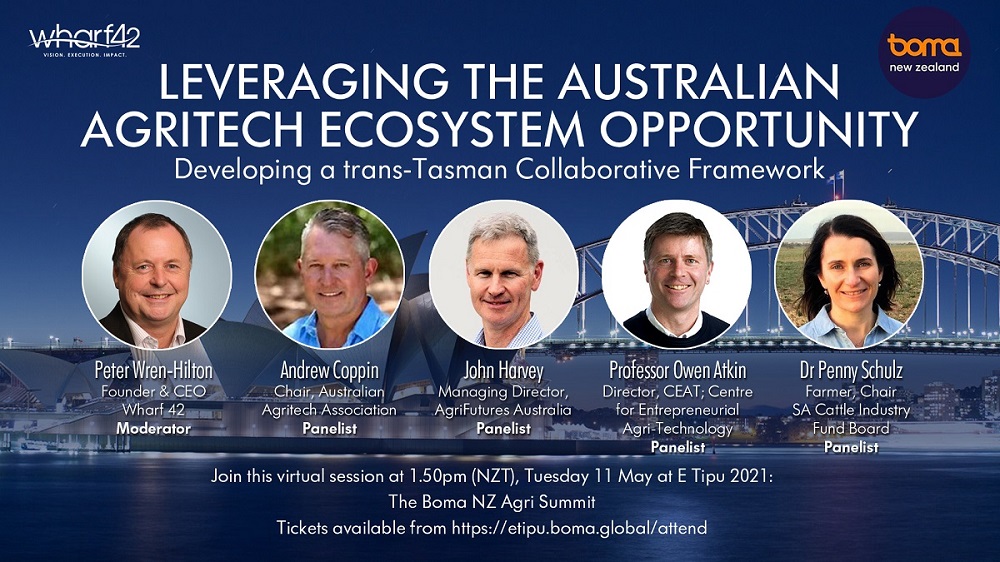
by Peter Wren-Hilton | Apr 19, 2021 | Events
Wharf42 is delighted to be moderating this virtual session at E Tipu 2021: The Boma NZ Agri Summit at 1.50pm (NZT) on Tuesday 11 May.
Over the past three years, through my various roles at Agritech New Zealand, the Australia New Zealand Agritech Council and most recently, the Australian Agritech Association, I have been a very strong advocate for building an active and effective trans-Tasman collaborative agritech framework. The region provides an exciting global hub for agri-focused scientific research, a thriving agritech sector and increasing pools of investor capital. As both countries open up a mutual quarantine travel bubble, the rest of the world is looking closely at developments in our corner of the world. Building on that interest, learning more about the Australian agritech landscape and promoting the trans-Tasman region as a leading global agritech hub is front and centre for this virtual session.
I’m being joined by four great Australian panelists:
- Andrew Coppin is the Chair, Australian Agritech Association. Andrew is also the Chair and Managing Director of Farmbot Monitoring Solutions, a rapidly growing early stage agritech company that focuses on remote water monitoring, controls and data.
- John Harvey is Managing Director of AgiFutures Australia, a Rural Research & Development Corporation. I’ve been honoured to sit on two AgriFutures Australia steering committees; evokeAG & growAG.
- Professor Owen Atkin is Director of CEAT; the Centre for Entrepreneurial Agri-Technology. The Centre is a joint collaboration between the Australian National University & CSIRO, creating an agritech innovation precinct at the University campus in Canberra.
- Dr Penny Schultz runs a family cattle and sheep operation at Field in South Australia’s Coorong region and is Chair of Limestone Coast Landscape. Penny is the immediate past Vice President of Livestock SA and Chair of the SA Cattle Industry Fund Board.
The panel brings together industry, research and government. It’s this unique combination which reflects New Zealand’s own collaborative model, best illustrated during the development of New Zealand’s Agritech Industry Transformation Plan.
During this virtual session, I’ll be seeking to get a better understanding of the current Australian agritech landscape and hopefully identify some of the opportunities to scale up increased trans-Tasman collaboration. As the world looks at us for post-COVID inspiration, I believe that this session will uncover some of the amazing opportunities that lie ahead.
To join the session, you can purchase a ticket (for the entire 2-day virtual event) at https://etipu.boma.global/attend
I hope you can join us on the 11th.
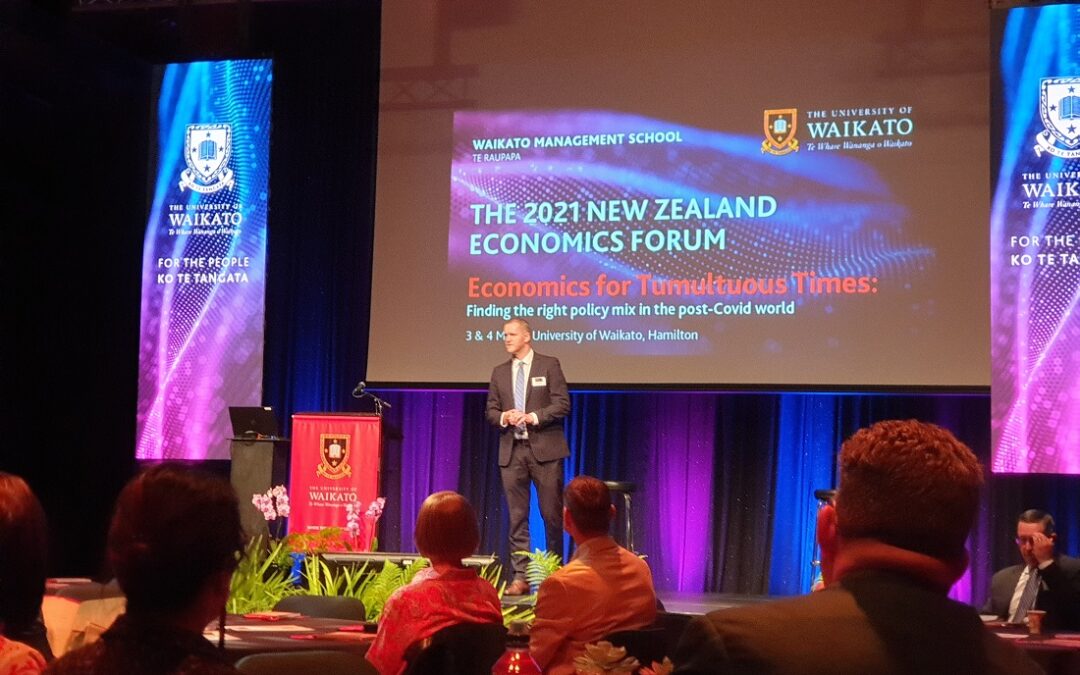
by Peter Wren-Hilton | Mar 3, 2021 | Events
Yesterday, Jacqui and I had the opportunity to attend the 2021 New Zealand Economic Forum, hosted by the University of Waikato & Waikato Management School in Hamilton.
Having spent several months working on this week’s AgriFoodTech Climate Summit announcement, it was good to be able to focus on some of New Zealand’s post COVID-19 macro economic challenges as well as network in-person with a number of new and familiar faces.
The Forum attracted a number of highly experienced speakers. Among them;
- Professor Neil Quigley – Vice Chancellor, University of Waikato and Chair of the Reserve Bank of New Zealand
- Gr Ganesh Nana – Chair, New Zealand Productivity Commission
- Professor John Gibson – Professor of Economics, University of Waikato
- Hon Grant Robertson – Deputy Prime Minister of New Zealand
- Dr Eric Crompton – Chief Economist, The New Zealand Initiative
- Cameron Bagrie – Economist at Bagrie Economics
- Professor Paul Dalziel – Professor of Economics, Lincoln University
- Rt Hon Sir Bill English – Former Prime Minister of New Zealand
The Forum’s subhead was ‘Finding the right policy mix in the post-Covid world’.
The subtext that emerged from the day’s event that most caught my attention however really took hold during the final panel discussion involving Crompton, Bagrie & Dalziel. They introduced a concept that in Wellington is known as the ‘Policy Authorising Environment’. This was new to me.
Essentially it means that Ministers and their senior officials, will often fail to support policies because they contain an element of risk. This has, in the view of the panel, led to a lack of public sector policy experimentation. Whilst the private sector has frequently been urged to take rapid and agile steps to address disruption by shareholders / investors, government by contrast has no such oversight and is therefore much more risk averse. Incremental change rather than transformation change is therefore often the preferred option. Given the Forum’s subhead, in a post-COVID world, will this approach be enough?
One interesting example given related to The Living Standards Framework which represents the Treasury’s perspective on what matters for New Zealanders’ wellbeing, now and into the future. Treasury considered the role of ‘innovation’, but deferred any inclusion of ‘innovation’ into its recommendations to a consultation process to be completed in 2022. One would frankly hope that innovation and growth would be at he heart of any productivity and wellbeing settings. The fact that Treasury deferred on this is I guess a good example of the ‘Policy Authorising Environment’ at work.
The discussion around ‘public policy settings’ came up a number of times during the day. A common held view was that there are not enough enabling frameworks being developed by the public sector. As New Zealand emerges into a post-Covid world, developing such frameworks should be a priority. Otherwise we might all just suffer from Cameron Bagrie’s quote of the day, From a government perspective, “failure is simply deferred achievement”.
Today, the guest list of quality speakers continues with Adrian Orr, Governor, Reserve Bank of New Zealand and Vittoria Shortt, CEO, ASB Bank, joining the list.
The most anticipated session for me is the panel discussion on Economic Policy and the Environment – challenges and opportunities. Vicky Robertson, Chief Executive, Ministry of Environment is being joined by Matt Burgess, Senior Economist of the New Zealand Initiative and Dr Victoria Kahui from the University of Otago. Robertson sits on the new public sector Climate Change Chief Executive Board and co-chairs Aotearoa Circle. Whilst there was occasional reference to climate change and its long term impact by speakers yesterday, this is the one session where I expect the subject to dominate.
It comes as the government has announced an extension to the submission date for feedback on the Climate Change Commission’s Advisory to government. Wharf42 intends to submit a response to this call. In this spirit, I hope that today’s panel discussion focuses on the ‘walk’ and not just the ‘talk’.
The time for taking positive and real action has come.

by Peter Wren-Hilton | Jan 26, 2021 | Events
Undoubtedly one of my favourite NZ Tech events of the year. Sadly I missed tonight’s Auckland launch at PwC, but that’s the price of being based in Tauranga 
If case you missed that post, you can read it here: Living the Tauranga dream. Why we do it. | Wharf 42
Once again, I’ve been asked to be a judge in this year’s Agritech Category with an esteemed group of peers. We are inviting New Zealand agritech companies to submit applications so that we have the chance to review some of the amazing innovation and technology emerging from Aotearoa’s finest.
To be eligible for this category, you need to be a registered NZ company and qualify against at least two of the following criteria:
- Founded in NZ
- Headquartered in NZ (the location of your global head office)
- Have at least 20% of your employees reside in NZ
In entering this category:
- You have developed a technology-based solution for use by those in the primary sector including (but not limited to) fishing, farming, forestry and horticulture.
- Your Agritech solution is genuinely innovative and you can demonstrate how it’s positioned for future success.
- You will be able to provide evidence of at least one commercial sale in the last calendar year; ending 31 December 2020.
- Upon request, you will promptly supply the judges with evidence to support any claims made in this entry and be able to prove that:
- The solution was designed in NZ
- Your company owns or has rights to use the IP
The Award category is sponsored by
New Zealand Trade & Enterprise. Previous winners include
Compac Sorting (2020), Robotics Plus (2019), Gallagher Group (2018), Outpost Central (2017)
Being a finalist in these Awards provides a great opportunity for agritech businesses to raise their profile in both the domestic market and offshore. The final selection process for each category includes input from invited International Judges who join the local NZ judging team.
You can enter online by visiting: Most Innovative Hi-Tech Agritech Solution — NZ Hi-Tech Awards
I very much hope you enter and look forward to meeting all the finalists in this category at the Hi-Tech Awards Gala Dinner at the Spark Arena in Auckland on Friday 28 May.
If you want to learn more about the ongoing development of the Wharf42 Insights Programme and other initiatives currently being kept under wraps, please sign up for our free Monthly Newsletter.

